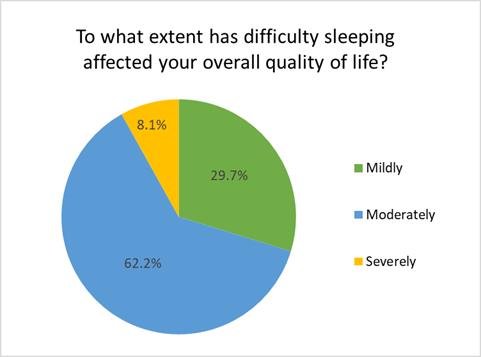March is Multiple Sclerosis Awareness Month, and MSAA has dedicated this year’s campaign to Improving Mental Health and Wellness. As part of the 2021 campaign, MSAA surveyed My MSAA Community members about their experiences with sleep, staying connected, diet and exercise, and self-care. Throughout the month, we will be posting results of the survey along with insights and tips from leading MS neurologists on each topic.
The first topic we invite you to learn more about is: The Importance of Sleep. Of those who responded to the survey, nearly two-thirds reported having difficulty sleeping over the past six months. Additionally, more than 70% indicated this moderately to severely affected their overall quality of life, and close to half were not taking steps to improve their sleep.
Recognizing these challenges and the critical role sleep plays in one’s mental and physical health, MSAA asked MS expert Annette Okai, MD to share her insights and helpful strategies on ways to better understand and manage this key health need. According to Dr. Okai, “The main purpose of sleep is to restore the body and to build up, strengthen and restore the systems of the body, including the mind and immune system, to perform their vital functions. Waking up refreshed is key to having a productive day. The mind and body are in a healthy state for the day ahead.”
“It is important to practice good sleep hygiene to start the process of restoring and rejuvenating the mind and body. It helps to have a pre-bed routine; have a good mattress that supports the body, decrease distractions (e.g. decrease use of electronics closer to bedtime) and monitor food and drink intake closer to bedtime.”
“Despite proper sleep hygiene, some people with MS have difficulty sleeping. Impaired sleep can affect quality of life. There are various reasons for impaired sleep in people with MS. Primarily, symptoms of MS can interfere with sleep. Common symptoms include frequent urination, pain and stiffness, and anxiety.”
“Lack of sleep can produce fatigue. The body is not fully rejuvenated and therefore fatigue appears early in the day and leads to daytime hyper somnolence (sleepiness). The impact on function can be detrimental to how productive a person is during the day. Impaired sleep can affect cognition. Brain cells, not sufficiently recharged, are impacted and results in difficulty with memory, concentration, focusing and thought processing.”
“Patients with MS who have difficulty sleeping should speak with their healthcare provider regarding symptoms that are impacting sleep. Addressing stiffness and spasticity or reducing the amount of trips to the bathroom at night can go a long way in improving sleep quality. Identify sources of stress and anxiety and work with a provider to address them. Sometimes, a sleep study is needed to assess for other factors impacting sleep.”
“These are a few pointers to inform about the importance of sleep and the impact on productivity and quality of life. An important thing to remember is that good quality sleep is a key to improved productivity and quality of life. Please be sure to talk with your healthcare provider.”
MSAA would like to thank Dr. Okai for providing her expert advice and helpful tips on this important topic. Please look for upcoming survey results and expert insights throughout the month.
- John, MSAA

